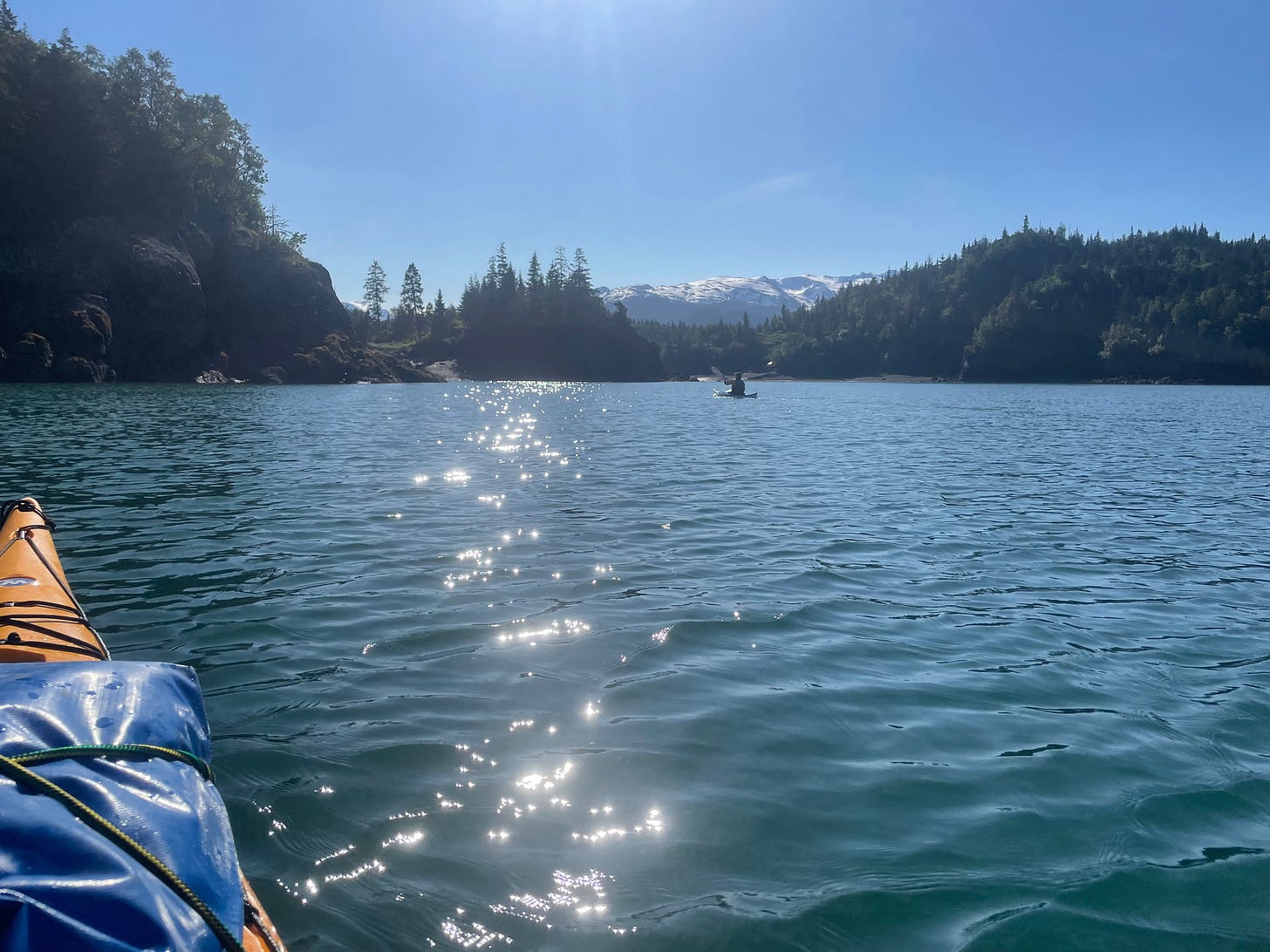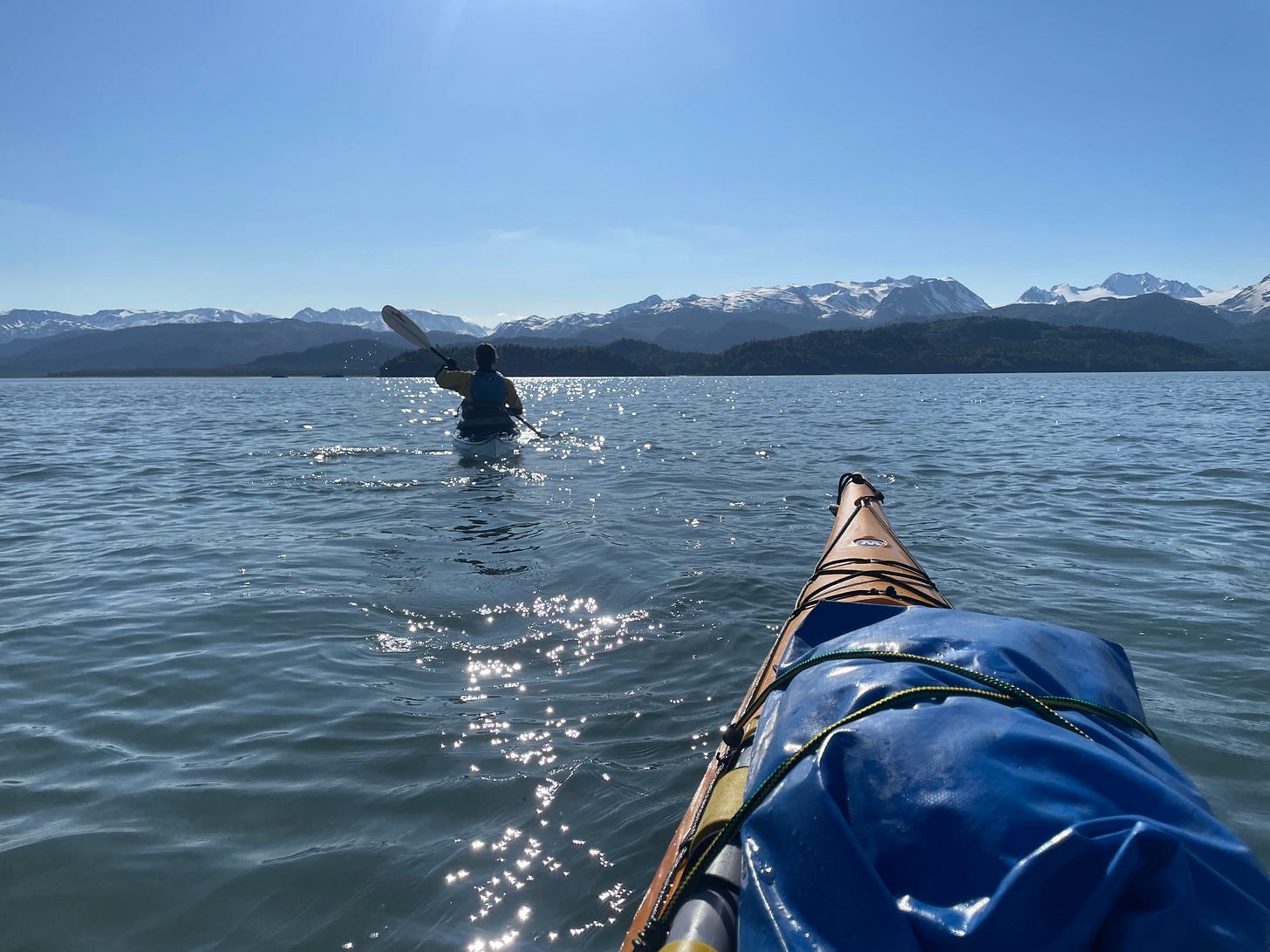The Back Door Wilderness
By Hal Shepherd
Note: Jessica posted her version of a weekend kayak trip on Tuesday. Now you get Hal’s version
Recent my wife Jessica and I stepped away from the usual grind—politics, work, all of it—for a much-needed kayak camping trip around the east end of Kachemak Bay.
On a Friday, we drove the 2-mile steep road from our house down to Kilcher Beach, where we launched in the early afternoon. The wind was gusting steadily out of the southwest, and the two-foot swells kept us alert. Because of a deep low tide, we had to haul our gear-laden boats a hundred yards across the mud and wait until the incoming tide crept in far enough to float them.
Roughly an hour later, I was broadsided by a large swell and had to hard brace on my left side to keep from rolling, and then, half an hour later, the same thing happened to Jessica. After that, we decided to take a break and pulled up onto the beach to reevaluate our options due to the worsening wind and swells. After finding a spot further up the beach out of the wind, we considered whether we should turn back, wait it out, or attempt to hike up the beach to Eastland Creek Cabin, which we guessed could be anywhere from one to two miles up the beach and possibly not accessible due to the incoming tide.
After about 30 minutes, the wind started to ease, so I decided to shuttle the boats and gear further down the beach to a small point that offered a better view of the water beyond. At 3:30 p.m., I paddled one of the kayaks to that point and, to my surprise and relief, realized we'd landed right in front of the Cabin itself. I met Jessica partway back as she was hauling gear by hand, and gave her the good news. After spending the night at the Cabin and due to a rapidly receding tide, after another muddy, hundred-yard trudge through shallow, boot-sucking water, we launched from the beach there around 8:00 a.m. the next morning.
The east end of Kachemak Bay is a vast wilderness that deliciously swallows one up after launching from the Beach just below our house. Traveling east after that point, one is accompanied only by eagles, loons, sea otters, and shorebirds with little to no human contact, aside from the small fishing boats that tend to hang out mostly around the Bear Cove area.
The over 2 and half million acre Kachemak Bay Watershed, including the Kachemak Bay Fox River Critical Habitat Areas, the Kachemak Bay State Park and Wilderness Park and the Kenai National Wildlife Refuge, protects fish habitat within the Watershed by creating contiguous "green" corridors along inter-jurisdictional anadromous streams. Particularly, with climate change beginning to take a toll on the Bay's ecosystem, these unique areas serve as a vital sanctuary or at least a place where climate-related impacts affecting fish and wildlife can be kept to a minimum.
The Kachemak Bay wilderness and the fish and wildlife habitats that depend on them, however, are under siege after republican political leaders have introduced plans to privatize state and federal public lands. The most recent of these threats is contained in the text for a mega tax bill that is being rushed to President Donald Trump, who was the original sponsor. Among other disastrous provisions, the bill mandates an unprecedented sale of public lands to help pay for tax cuts for billionaires. Without public comment and starting within 30 days of the passage, the Bill mandates the sale of 2 million acres of federal land in 11 western states and Alaska, to the highest bidder over the next 5 years. In addition, more than 250 million acres are eligible for sale, making it the largest single sale of national public lands in modern history and threatening sacred lands, water supplies, recreation areas, wildlife habitat, and much more all for the purpose of helping cut taxes for billionaires.
According to Drew McConville with the Center for American
Progress:
Notably, the House of Representatives rejected a public lands sell-off proposal in their version of this bill after it provoked strong and notable opposition from Rep. Ryan Zinke (R-MT) and other Republican officials. But bill text released by the Senate Committee on Energy and Natural Resources on June 11—as well as amended bill text first published by Politico's E&E Daily on June 17—contains sell-off language that's substantially more expansive.[1]
Back in the boats, with calm seas and minimal wind, by 10:00 a.m., we reached Chugachik Island, a small rocky haven, near the mouth of Bear Cove, that is home to sea otters, black bears, eagles, songbirds and cultural sites. Upon arrival, we set up our tent, and indulged in the traditional post-paddle nap while listening to the beginning of the day breeze swish through the increasing surf, lush vegetation, and songbirds.
At 12:30 p.m., we hiked the short trail to Seal Beach. But within 50 feet, we hit a major snag—several large spruce trees, likely brought down by the heavy December 2024 snowstorm, had collapsed across the trail. One especially big tree appeared to have pulled others down with it. Armed only with loppers and a handsaw, we couldn't make much progress in clearing the mess but did manage to trim a few limbs and widen a detour path that prior hikers had started. We spent the rest of the afternoon clearing the worst of the trail's overgrowth, most notably the ever-encroaching Devil's Club and left the full cleanup to a future team with a weed whacker and at least one chainsaw.
On Sunday, June 15, to beat the Day Breeze and resulting swells, I hit the water during a quiet lull at 6:10 a.m., returning across a glassy bay to the Eastland Creek Cabin to resupply water and empty a few squirrel traps. By 7:45 a.m., I was headed back to Kilcher Beach.[2] Just before getting there, I noticed a handful of Loons who, undisturbed by my non-motorized presence, floated and called in their haunting melodies. I reached the Beach just after 9:00 a.m.—blessedly, at mid-tide, which meant a much gentler landing and less mud.
Help to preserve Alaska's unique back door wilderness like Kachemak Bay:
Call Lisa Murkowski - Anchorage (907) 271-3735/ Washington D.C (202)-224-6665.
Also Call Dan Sullivan: Washington Office: (202) 224-3004/Anchorage Office:
Phone: (907) 271-5915;
Tell them to Defend Public Lands in Alaska and oppose handouts to big corporations and provisions that harm our communities in the Budget Reconciliation Bill.
[1] Drew McConville, What To Know About the Senate's Public Lands Sell-Off, Among other damaging proposals, the One Big Beautiful Bill Act includes a controversial plan to sell off public lands to pay for billionaire tax breaks. Center for American Progress (June 18, 2025).
[2] Please ask permission to use the road down to the beach to access the Bay by contacting the Kilcher Homestead.




What an adventure!